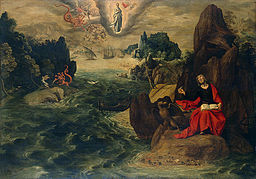 On Theological Differences
On Theological Differences
Some scholars who do not attribute Revelation to John, the well-known apostle of Jesus, point to significant differences in the theology of Revelation versus the theology of John’s other works. The differences with respect to theology are the easiest to address, because they often rely on a rigid typecasting of the author of the Johannine books. The most often cited example is the realized eschatology of the Gospel of John and 1 John, which focuses so much attention on the already versus the not yet. In comparison, the book of Revelation has a much greater focus on the not yet, that is, on consummated eschatology. As George Ladd has shown, the eschatology of the New Testament writings contains both of these eschatological emphases (Theology of the NT, ch. 4). It is true that the Gospel of John and 1 John emphasize realized eschatology in their teaching. However, they also contain some measure of consummated eschatology in the form of promises from Jesus about a future with him in glory (John 14:3; 17:24). Similarly, the focus of Revelation may fall upon the future and what is to come, but it does not neglect significant statements about the effects of the cross upon the here and now (Rev. 1:5; 5:9-10; 12:10-12). I will trace both realized and consummated elements in this commentary. Indeed, a careful examination of John’s works would appear to support the idea that their different eschatological emphases are complementary. Furthermore, even with respect to realized eschatology, it is possible for the two books to complement one another. For example, John 12:31 says, “The ruler of this world will be cast out.” His casting out is related to the lifting up of Jesus (12:32), that is, his death on the cross, resurrection, and exaltation. In Revelation 12, the cross and exaltation of Jesus are related to the casting of Satan from heaven to earth (12:5, 11). Revelation 12:7-9 describes the casting out to which John 12:31 refers.
On Theological Similarities
The theological differences among John’s works could be countered with a list of their theological similarities or affinities. I provide numerous examples of theological similarities in my commentary. The commentary shows that John’s other works provide valuable assistance for the interpretation of Revelation. Christology is obviously a central element for the Gospel of John and Revelation. The Christology of the two works shares similarities that set them apart from other books of the New Testament. First, in both works, Jesus is the Lamb who suffers a sacrificial death. His sacrificial death fulfills the Passover and delivers the people of God from sin, slavery to sin, and the Devil (see comments on Rev. 5:9 in my commentary). The Johannine parallels here are strong and distinctive. Second, Jesus receives the name logos (“the Word”) only in the Gospel of John and Revelation (John 1:1-18; Rev. 19:13). Third, in John 19:37 and Revelation 1:7, Jesus is the fulfillment of Zechariah 12:10, which says, “They will look on him whom they pierced.” Fourth, in John’s works, Jesus is the first witness who leaves behind his “testimony.” After him, his followers will take up this mantle. They will be witnesses who will proclaim the testimony that they received from Jesus (see, for example, John 8:18; 14:26-27; 18:37; Rev. 1:2; 11:3; 12:12).
Sources and Additional Note:
1.These paragraphs are adapted from my book:
Paul Hoskins, The Book of Revelation: A Theological and Exegetical Commentary, pp. 17-18 (those pages provide further sources and footnotes that I have omitted above).
2. For further discussion of theological connections, see Beckwith, Apocalypse, 357-9; Prigent, Apocalypse, 41-45; Smalley, Thunder and Love, 58-63.
